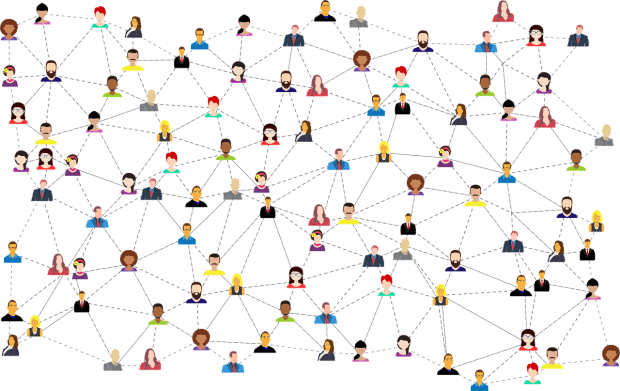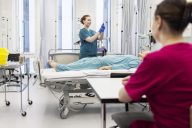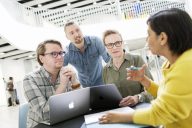Homework, experiments, essays, even physical education, all being done by children, adolescents and adult learners all over the world in front of their laptops, from their homes. Never before have parents, spouses and other significant others been so close to the pedagogical aspect of educational process. The coronavirus crisis has changed our daily life in so many ways, but education has been in the spotlight since the beginning of this uncertain new decade.
The world from home
By the end of March, Unesco estimates that almost 90% of the world’s student population has been affected by worldwide closures of schools. In Finland, contact teaching has been suspended from 17th March 2020 – except for early childhood and pre-primary education (grades 1 to 3). Thus, about one million learners from primary school pupils to higher education students are studying online at least until mid-May this year, without knowing exactly when they will return to school buildings and university campuses again.
Remote learning has become a reality on such a scale that not even the most optimistic Edutech executive could have predicted. But it came with many concerns, too, especially for the vulnerable population being them in Finland or Somalia. Firstly, nearly 60% of the globe’s population is online, so a lack of access to the internet is still a barrier for many students. Secondly, specialists are concerned that remote learning could enlarge the gap of inequality. And last, but not least, many kids depend on the school to get a decent meal.
Still, the general feeling is that governments, companies, and NGOs are making a considerable effort to keep the learning going. Google, Microsoft and Zoom, for example, are offering many of their video conference software for free since the beginning of the crisis. Finnish Edutechs partnered up to provide free resources suited for distance learning. The Hongkong government, for example, announced that it should maintain a consortium providing more than 900 educational assets for free even after COVID-19 is under control.
Will this crisis change the way we see and implement education?
Specialists of the World Economic Forum writes that this unique experience might also be an opportunity to remind ourselves of the skills students need in this unpredictable world. Resilience is a value that must be woven into the educational system to make sure that those skills continue to be a priority for all students.
Chip Paucek, chief executive of the online education company 2U Inc., expects that after schools try online tools during the outbreak, they’ll be more inclined to opt for “blended” educational experiences that mix in-person classes with online tie-ins after the situation improves.
As nobody is considering shutting down schools and universities forever, it seems that the task will be to retain the online learning aspects and integrate them with face-to-face learning. Hamish Coates, director of the Higher Education Division of the Institute of Education at Tsinghua University, told The Times Higher Education that “there will almost certainly be a post-virus boom” in online higher education.
SIMHE-Metropolia moved services swiftly to the virtual mode
The guidance and counselling services have now been implemented solely online since mid-March at SIMHE-Metropolia. In normal times, the majority of our guidance and counselling customers wish to meet face-to-face at the Metropolia Myllypuro campus. However, providing counselling via phone or over the internet is not totally alien to us as meeting remotely has served some customers’ needs the best in the past, too.
Being available online gives a total new concept of accessibility and convenience for the personal guidance discussion as there is no need to travel anywhere on either side. There is also more flexibility in scheduling the meeting times and customers have been very up to the new mode of meeting so far. The downside is a lack of all cues of non-verbal communication and the closeness and togetherness that can be experienced when sharing the same physical space.
For now, two Guidance Generalia lectures have taken place virtually with over 30 participants. All has gone remarkably well, and elements of two-way communication were established via chat and the attendants posed questions quite actively. The lecture series will be carried out as a web-based format for the rest of the spring-term, and perhaps continue to co-exist with the face-to-face lectures once we are able to be campus-based again.
The digital future is already here
Even though the digital leap of the 2020’s was somewhat forced for many, the elements of web-based learning have emerged prior to the crisis too. At Metropolia, online teaching and guidance and counselling for preparatory course for immigrants was tested out in 2019 as part of the Getting Ready – A higher education program for immigrants project. As we are facing a somewhat unpredictable future ahead, Metropolia will offer preparatory courses for immigrants online also in autumn 2020.
Teachers now have needed to adjust, not only the methods, but how to acquire a new mindset towards teaching. For Anne-Mari Raivio, senior lecturer of School of Business at Metropolia, the next step is to focus not on the tools but on the pedagogical side of online teaching and learning. “After this mandatory digital leap we will have more brains thinking about how we can add and create meaningful digital encounters to enhance learning”, she says.
Undebatably, the societies around the globe will wake up to a different morning once the pandemic has surpassed. Millions, if not billions, of people have now learnt to work and study from home and this is not to be regarded only as a bad thing. In Finland, like the students, over a million workers have confined themselves in a remote work-mode, and about half of them are willing to continue this way even after they are able return to the offices one day.
We do not know how this all will end, but perhaps we could confide in Albert Einstein’s wisdom in his quote “In the midst of every crisis, lies great opportunity.”
Writers
Juliana Holanda is a Brazilian journalist who lives in Finland since 2019 and has used SIMHE-Metropolia’s guidance and counselling services as part of her integration process.
Marianne Autero works as a career coach at SIMHE-Metropolia.
Sources
- COVID-19 Educational Disruption and Response. Viewed 6.4.2020
- Digital trends 2020: Every single stat you need to know about the internet Viewed 6.4.2020
- Helsingin Sanomat 13.4.2020. Etäopetusta saa nyt miljoona opiskelijaa, mutta varsinaista kotikoulua käy vain noin 400 oppilasta. Viewed 13.4.2020
- Free apps and resources to support distance learning in schools affected by the coronavirus outbreak. Viewed 6.4.2020
- 3 ways the coronavirus pandemic could reshape education, World Economc Forum. Viewed 6.4.2020
- This is online education’s moment’ as colleges close during coronavirus pandemic. Viewed 6.4.2020
- Will the coronavirus make online education go viral? Viewed 6.4.2020
- SIMHE-Metropolia. Viewed 6.4.2020
- Metropolia Myllypuro campus. Viewed 7.4.2020
- On-line counselling pros and cons. Viewed 13.4.2020
- Guidance Generalia lectures. Viewed 13.4.2020
- Getting Ready – A Higher Education Preparatory Program for Immigrants. Viewed 13.4.2020
- SIMHE-Supporting Immigrants in Higher Education in Finland. Viewed 13.4.2020
- E-mail interview with Senior Lecturer Anne-Mari Raivio, Metropolia University of Applied Sciences
- YLE uutiset.5.4.2020. Yli miljoona suomalaista siirtynyt etätöihin koronakriisin aikana – heistä noin puolet haluaa jatkaa etätöissä koronan jälkeenkin. Viewed 13.4.2020











No comments